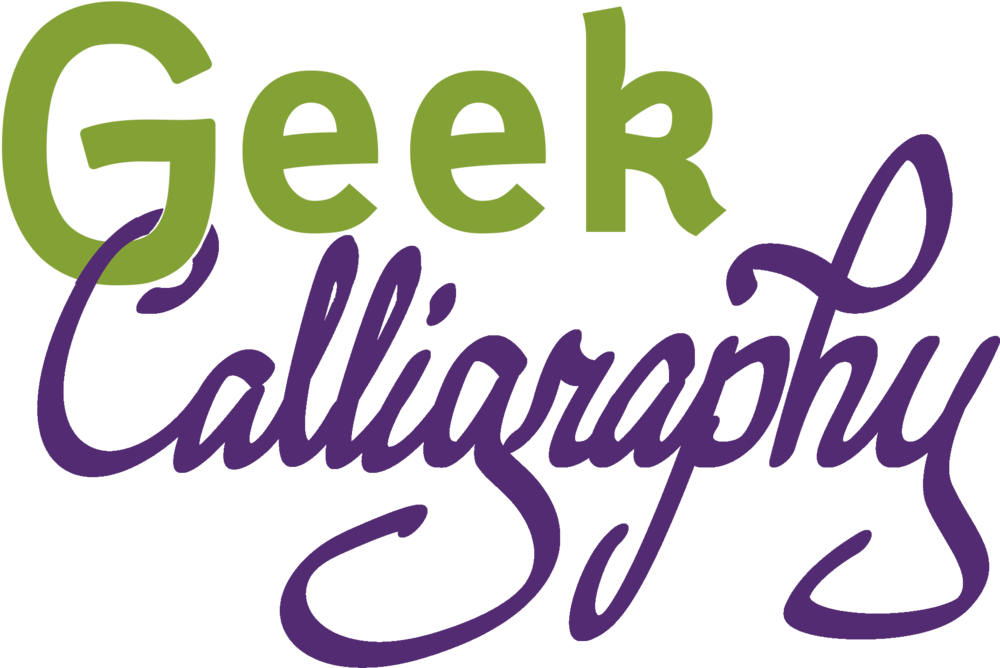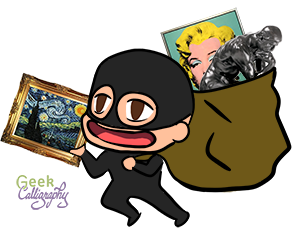by Terri
Image is of a masked chibi committing Stereotypical Art Theft. They are holding a framed Starry Night, and have Rodin's Thinker and Andy Warhol's Marilyn Monroe in their sack.
Since today is Labor Day, I wanted to take some time to talk about art theft. When most people think art theft, they think White Collar-esque heists or the exhibit at the Isabella Stewart Gardner Museum. Unfortunately, most art theft in the digital age is far more mundane. Its mundanity in no way decreases the harm it causes to artists.
Several types of art theft exist:
- Use in a Commercial Venture: this is when you take someone else's art and upload it somewhere (Threadless, RedBubble, etc) that you can make money from it. It also includes using an image to illustrate a website, blog, or article for which you are getting paid, online or in print.
- Non-Commercial Public Use With Attribution but Without Permission: this is when you share an artist's work on the internet. You have left their watermarks/identifying features intact (possibly also included a link to their site), but the artist has not given permission for this work to be shared widely. For example, doing a Google Image search to find a good thumbnail image for your personal blog post, giving all of the proper credit, but failing to check that the original source's Terms of Service allow for free sharing of content.*
- Non-Commercial Public Use Without Attribution: this is when you share an artist's work without any way of tracing it back to that artist.
- Private Use: printing out art from someone's website and hanging it on your wall,** is really the most egregious example of this that I can think of. In addition, using an image to make a t-shirt just for yourself.
In none of these cases was permission sought or payment given. Each is bad in different ways, and some people might not realize that they are all bad and all are theft. In the case of the latter three, people might think that it's OK because they themselves aren't trying to profit from the theft. This is incorrect.
What are the consequences of theft? So many. For starters, there is the direct loss of wages. Even if it's just printing something out for personal use, that's one print sale the artist isn't making. If their design is on something that can be purchased from you, they're not making money from their work, you are. An artist loses time they could be using to make art when they have to spend it asking you to please stop using their work. Sometimes an artist needs to pay someone else to make sure that their IP is being properly protected. There is also the loss of recognition and brand building opportunities. If Geek Calligraphy's art is running around on the internet without attribution to the business, how do people who see it and like it know where to buy it? You might love someone's work, but if you don't know who they are, you can't nominate them for awards. In addition, theft results in the loss of intellectual property, which can like a violation of self and cause significant worry and emotional upheaval.
It's not that we don't want other people to benefit from our work - part of what we love about making art is that other people benefit from it. But we do object to other people benefiting from it without us being paid, or at least having the opportunity to waive payment, such as in donations-in-kind to charities.
Respecting intellectual property rights is more than just not stealing. It means sharing pictures with appropriate attributions and actively crediting artists when you see their work being shared without attributions. If you need a thumbnail image for a blog post or a background for a presentation slide, use the filters that Google provides to allow you to only find images that are OK for reuse.
In my freelance job, I make sure people get paid. Either by making sure that they're negotiating for the correct salaries, or by making sure that no one illegally profits from their work. I have had to send a DMCA takedown on behalf of one of my clients, because doing it herself was making her feel physically ill. I would love to be put out of the second half of that aspect of my job, but it is unfortunately necessary. If you are an artist who needs someone to be Professionally Angry on your behalf, I am taking clients on a case by case basis. You can find me on Facebook, Twitter (as @crewgrrl) and my professional email here on this site. I am not cheap, but I am effective!
*Not speaking from personal experience or anything. Nope.
**This is a real thing, and it has happened to us. It's why we released Mini-Cordthulhu.

